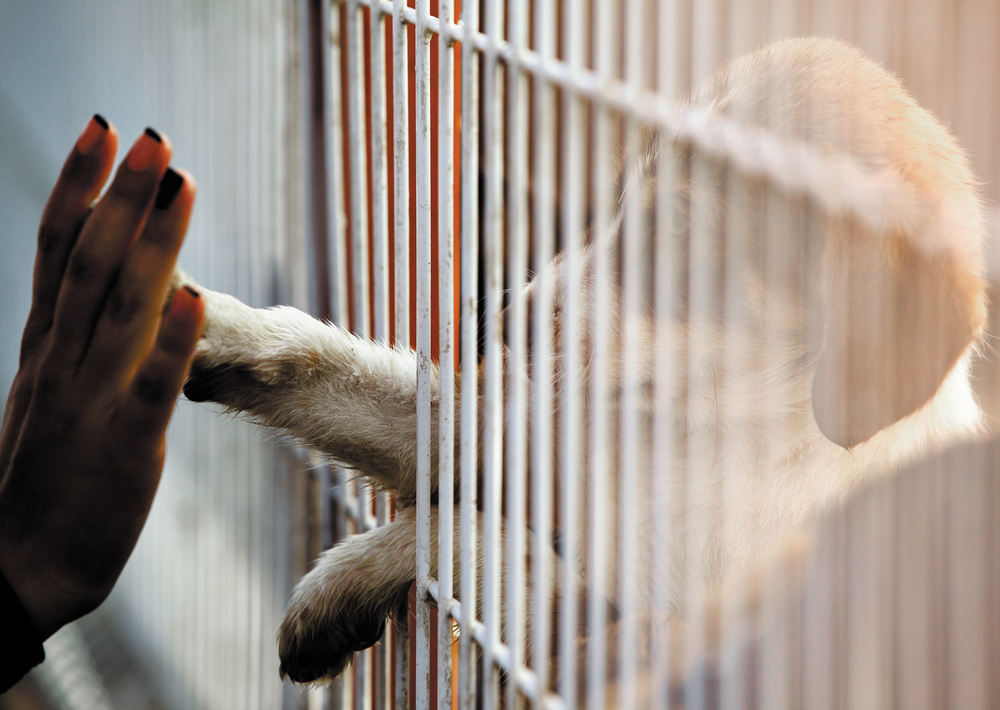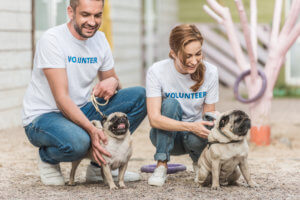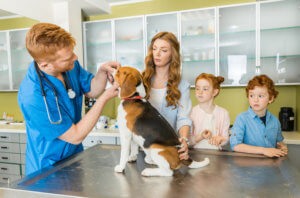
What do I need to know before adopting a dog?
It’s Sunday afternoon. You’re at the local shelter with your partner/friend/child/sibling/person “just taking a look” and definitely not adopting a dog when you stumble upon the cutest critter you’ve ever seen. And your partner/friend/child/sibling/person agrees.
Excitedly you ask the agency volunteer for an application form and BAM! Questions like, “how often will you take your dog to the veterinarian?” and “how will you train your dog?” slowly begin to stifle your once unbridled excitement. Blinded by furry promises of cuddles and companionship, it’s easy to forget that adopting a dog requires a lot of energy and effort before they even step foot in your home!
Speaking from experience, adopting a dog can be intimidating if you haven’t done it before. This is where we come in. Above all, this article should answer that very important question:
“what do I need to know before adopting a dog?”
First things first…
Prepare Yourself
It’s natural to want to run right to the pet store and buy everything you need once you decide to adopt a dog. Before you buy one chewy toy, water bowl, or tasty treat, spend time preparing yourself and your life for your new furry friend. You’ll thank yourself later when you haven’t wasted countless dollars and energy on items and efforts that your dog doesn’t need or enjoy.
#1: Do your research and ask questions.
Read everything and anything you can about adopting a dog. (Good on you for reading this article!) Different breeds have unique characteristics that can affect your experience with them and the kind of care they require. There are a lot of great resources out there that offer solid advice based on years of personal experience (ahem) and it can’t hurt to get different opinions. In particular, the Internet offers a ton of great resources, many of which are breed-specific and incredibly helpful. Not to mention it would also be beneficial to speak with the shelter staff or foster parent to learn more about your new friend.

You can never ask too many questions! For instance, good questions to ask include:
-
- How much exercise do they need?
- Are they crate-trained?
- How can I continue to train my new friend?
- What dog would be best for an active/sedentary/busy lifestyle?
For a more exhaustive list of questions, visit our friends Rescue Dogs 101 to find over 50 different important questions to ask!
(Please note: while all of the resources mentioned are great, when it comes to medical advice, you should only trust a licensed veterinary professional. This brings us to our next point.)
#2: Get a vet before adopting a dog.
A veterinarian is vital for the ongoing health and wellness of your furry friend. You must find a vet you can trust and have confidence in. Furthermore, it should be one of your first priorities to take your new dog to your vet as soon as possible, especially if you have other pets in your home. With this in mind, it is recommended that you take your new dog to see the vet within seven (7) days of adoption. Sometimes a disease or virus is transmitted between dogs in shelters or rescues (ie. kennel cough). Better to be safe than sorry!
Presently it is often more beneficial to adopt a dog rather than to purchase from a breeder. For example, agencies often cover important costs up front that you would normally pay yourself. In addition to the low expense (anywhere from $100-$500, compared to upwards of $1500 from a breeder), adoption agencies and shelters will often include two medical procedures in the adoption fee: spaying/neutering and microchip implantation. Notably some shelters will also perform a full health check, provide necessary vaccinations, and offer several weeks of free pet insurance. We recommend checking which insurance company your agency uses and finding a vet that works with that company. It takes time to find the best vet for your needs so start the search early.
#3 Check the shelter/agency’s requirements and do your paperwork when adopting a dog.
Animal shelters and adoption agencies are invested in finding the perfect home for the animals in their care. For this reason, they are thorough and specific when it comes to learning about the animal’s potential family. You can expect to receive an application form that may span several pages and ask questions about your lifestyle and how you plan to raise your pet. After receipt and/or approval of your application, you will most likely meet with a staff member for a personal interview. To explain, The Toronto Humane Society describes its interview process below:
[…] an adoption counselor will have a conversation with you to find out a little more about your lifestyle and what you are looking for in a companion animal. We will also provide advice about care and behavior training at this time, as well as detailed information about the companion you are interested in. This conversation is a good opportunity for us to get a sense of whether the animal is a good match for you and to ensure that both yourself and the animal will be happy together.
This process is key to ensure that you and your new friend are happy together and stresses the importance of why you should:
#4: Look for a dog that complements your lifestyle — not just one that’s Instagram-worthy.
We often pay attention to specific breeds because of physical features or because it is the breed we grew up with. If you’re looking to adopt a dog, you should be looking at other characteristics too. Some dogs require a lot of exercise and mental stimulation, while others might like to sit around or are happiest lazily lying on your lap. At the same time, dogs might even experience anxiety in large crowds or public places. Finding a dog that matches your activity levels and preferences is critical in developing a healthy and mutually beneficial relationship.
#5: Be open to change & able to adapt quickly when adopting a dog!
There are a lot of unknowns when it comes to adopting a dog. Many dogs have issues and no two dogs are the same. In fact, issues like separation anxiety are especially common in dogs adopted from shelters, according to the American Society for the Prevention of Cruelty to Animals. This was an issue that plagued our Diesel. For this reason, It is important to understand that your dog is unique and not compare them to other dogs. Roll with the punches, learn everything you can about your new friend, and be patient while you both get used to your new arrangement!
Prepare Your Space
#1: What do you need for your place before adopting a dog?
Below is a list of items we recommend you purchase for your home. This is not an exhaustive list but one we will update on a regular basis with our personal recommendations. Some of these are items that you can purchase and set up well in advance!
- Dog crate or carrier (hard plastic or foldable metal)
- Dog bed
- Sponge and scrub brush
- Non-toxic cleanser
- Enzymatic odor neutralizer
- Baby gate(s)
- Dog collar, leash, and identification tags (with your phone number!
- Nutritious dog food
- Food and water bowls
- Dog grooming tools (shampoo, brush, nail clippers, toothbrush & toothpaste)
- Dog toys (a ball, rope, chew toy and puzzle toy is a good start)
- Treats & chews (such as small cookies, larger rawhides, etc.)
- Plastic poop baggies (biodegradable ones are best) or pooper scooper
- Absorbent house-training pads
- Super-absorbent paper towels (or you can use your ratty old towels and save some trees!)
- First-aid supplies
Remember: dog ownership is a serious responsibility.
Your rescue dog may live for another two years or he may live for another ten! It is important to realize that a pet is a living creature solely dependent on you to survive and thrive. Enjoy the time you have with them and do your part to provide them with the best quality of life that you can!

Rescue Dog Adoption: Start Here!
You May Also Like





3 Comments
Steve
Very informative article – thank you ????
Lais
Great Article! We did a lot of research and still had to completely adapt when we adopted Orwell! Each dog is so particular.
AffiliateLabz
Great content! Super high-quality! Keep it up! 🙂